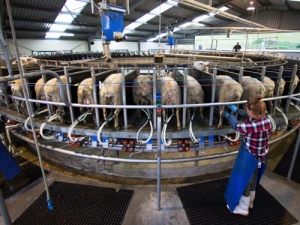Dairy sheep and goat turmoil
Dairy sheep and goat farmers are being told to reduce milk supply as processors face a slump in global demand for their products.
 The pure East Friesian embryos, which have been frozen in time since the late 1990s, will be an essential part of a new genetic improvement programme.
The pure East Friesian embryos, which have been frozen in time since the late 1990s, will be an essential part of a new genetic improvement programme.
Rising interest in dairy sheep is about to be matched by the availability of milking ewes thanks to 15-year-old frozen embryos.
The pure East Friesian embryos, which have been frozen in time since the late 1990s, will be an essential part of a new genetic improvement programme. Dr Jock Allison, the original importer of the breed, retained the unique gene pool.
Maui Milk general manager Peter Gatley and Jake Chardon attended a dairy sheep conference at Massey in February this year and found themselves in conversation with Allison.
They were surprised to discover that 1700 East Friesian embryos still existed in their pure form, untouched in liquid nitrogen for more than 15 years. A deal was done on the spot, and within weeks, the entire stock was surgically implanted in recipient ewes at Awapai in Hawkes Bay, owned by Simon Beamish, one of the Rissington Breedline founding partners.
Impetus for the initiative has come from the creation of Maui Milk, a joint venture partnership between New Zealand farming and Chinese marketing interests.
Mated over maternal breeds such as Poll Dorset, Coopworth or Highlander, the result is known as an 'F1', or first cross, a hybrid with milking ability, constitution and hybrid vigour.
Similar ewes have formed the basis of the flock of 3000 milked by the Waituhi Kuratau Trust, the Maui Milk joint venture partner farming west of Lake Taupo.
The females resulting from the embryo programme will be milked in 2016, providing valuable data on the comparative performance of the pure strain under local conditions, and the top performers will be selected as embryo donors. Rams from various bloodlines will be retained for progeny testing, and the remainder will generate up to 10,000 crossbred milking ewes in their first year.
Allison is delighted to see the potential of the gene pool being realised. "I didn't want to see those embryos go out 50 or 100 at a time because this would dissipate the value. There's a critical mass of genetic material there that these guys can work with. I've no doubt they'll create something special".
This initiative will not only drive genetic gain, but also carry out farm system development to provide a template for Kiwi farmers to replicate. It is known as Southern Cross Dairy Sheep Technology.
Farmer-led charity, Meat the Need is calling for donations to enable it to supply more meals to families in need.
Weaker pricing and demand from China continue to impact New Zealand red meat export earnings.
Fonterra has cemented its position as the country’s number one cheesemaker by picking up nine NZ Champion of Cheese trophies this year.
New Zealand dairy processors are welcoming the Government’s commitment to continuing to push for Canada to honour its trade commitments.
An educational programme, set up by Beef + Land New Zealand, to connect farmers virtually with primary and intermediate school students has reported the successful completion of its second year.
Horticulture NZ chief executive Nadine Tunley will step down in August.